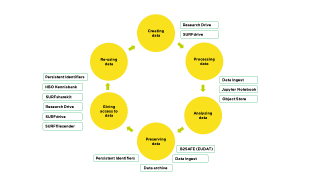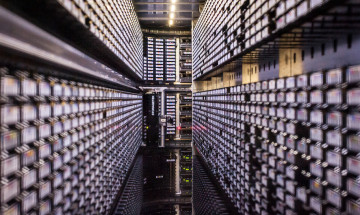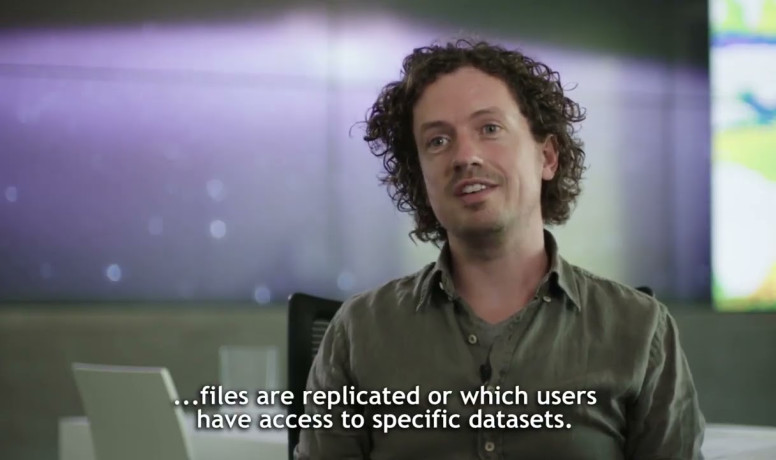Portfolio data services: What service do you need to manage and store your data?
We offer a wide range of services for different phases in the life cycle of your research data. This not only involves the secure storage of a large amount of data, but also, for example, data management, replication, retention and identification.
Data lifecycle
When choosing a particular storage infrastructure, it's not just about the type or amount of data. The research phase of the data is just as important. The chart below shows this.

In this chart, you can see the different stages that scientific data usually undergoes. Data is created with the aid of scientific instruments. It is then edited and analysed using one of our computing services. You then save the data and share it with other researchers. Finally, the data can be used again and the whole cycle starts over.
Complete service
SURF offers researchers the following services:
SURFdrive: An accessible online cloud storage service for Dutch education and research. You can use this service to store, sync and share files. Each user receives 500GB of storage space.
Research Drive: A service intended for research teams that require a lot of storage capacity. This allows you to easily share data with other institutions, the business community or international partners.
B2SAFE/Data replication: With this service you can safely store data in multiple locations. B2SAFE uses persistent identifiers as standard in order to be able to establish the location of the data in a sustainable manner.
Data Archive: this is the central location for the storage and (long-term) archiving of data. From this archive, you have quick access to the SURF computing facilities.
Object Store: This online storage service allows you to store large amounts of research data. This service is ideal for storing different types of data. Your storage space can grow indefinitely, while your data remains quickly and easily accessible.
Data Persistent Identifier: With this service, you ensure that your data is, and remains, always accessible. SURF offers this service together with the European Persistent Identifier Consortium (EPIC).
iRODS Hosting enables you to easily make use of the high-quality data management facilities that iRODS offers. Without spending time, resources or hardware on managing the software.
Are you wondering which service is most suitable for your data? This is a question that cannot be answered in general. That's why our consultants always start with tailor-made advice. Together, we will find the most suitable answer to your question. Below are a number of considerations that play a role in this.
1. How much data do you want to store?
Not every service offers unlimited storage space. For example, SURFdrive is particularly suitable for office data and smaller amounts of research data. The maximum space you receive is 250GB.
Are you looking for the capacity to store (very) large datasets? Then services like Research Drive, Object Store and Data Archive are good options. The storage space grows with your specific needs.
2. What do you want to do with the data?
In fact, that is the most important question. Do you want to actively edit or analyse your data? Then Research Drive and SURFdrive are the most obvious choices. You can use these services to share data easily. Do you want to archive and store data sustainably? Then the Data Archive service is the best option for you. See also the chart of the data lifecycle below. We coordinate the storage and computing services.
B2SAFE is also suitable when you want to share data within a research project. It also allows you to securely store data securely in multiple locations.
3. How is the data available?
If low-threshold access is important to you, SURFdrive and Research Drive are the products for you. You can use these tools to safely store and share your files. If your institution is connected to SURF, you can log in via SURFconext Edit Data (save, delete or move to another folder) via an easy to use web interface.
The Data Archive is accessible via the Internet. This archive supports various protocols for data transmission, such as (HPN)SCP, SFTP, rsync and GridFTP. These protocols work in both Linux and Windows environments.
Persistent Identifiers (PIDs) ensure that your data is findable and referencible. This service is a standard part of B2SAFE. Even if you store your data on one of our other infrastructures, you can still use PIDs.
Advice and consultancy
Our data infrastructure experts would be happy to help you choose the solution that best suits your research project. Contact us at info@surf.nl.
Would you like independent advice on setting up your data infrastructure, for example, or on making optimal use of SURF's computing and storage facilities? Then you can contact our consultancy service.
Investors are increasingly demanding that you deposit your research data in a Trustworthy Digital Repository (TDR). With long-term storage in TDR, you ensure that your research data remains accessible via Persistent Identifiers. This way, you can reuse existing data and archive your own data safely and for a long period of time. The RDNL partners 4TU.Centre for Research Data, Data Archiving and Networked Services (DANS) and SURF provide this standardised and well-documented storage.
At SURF, we work closely with organisations in the Netherlands and Europe in the field of data management. This cooperation is aimed at developing new services and exchanging expertise.
- In the field of data archiving, we work together with Research Data Netherlands (RDNL), as well as other organisations.
- With EUDAT, a European cooperation project, we work on European solutions for the storage and management of research data.
- Together with the European Persistent Identifier Consortium (EPIC), we offer services in the field of data identification.
Practical example: KNMI
Customers of our data and computing services must be able to rely on the fact that research data and other confidential information stored and processed by SURF are in safe hands. SURF is ISO 27001 certified. This means that we meet the high requirements of this international standard in the field of information security.

